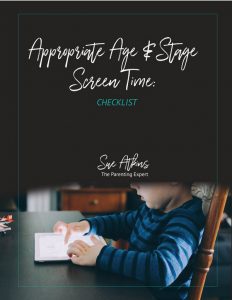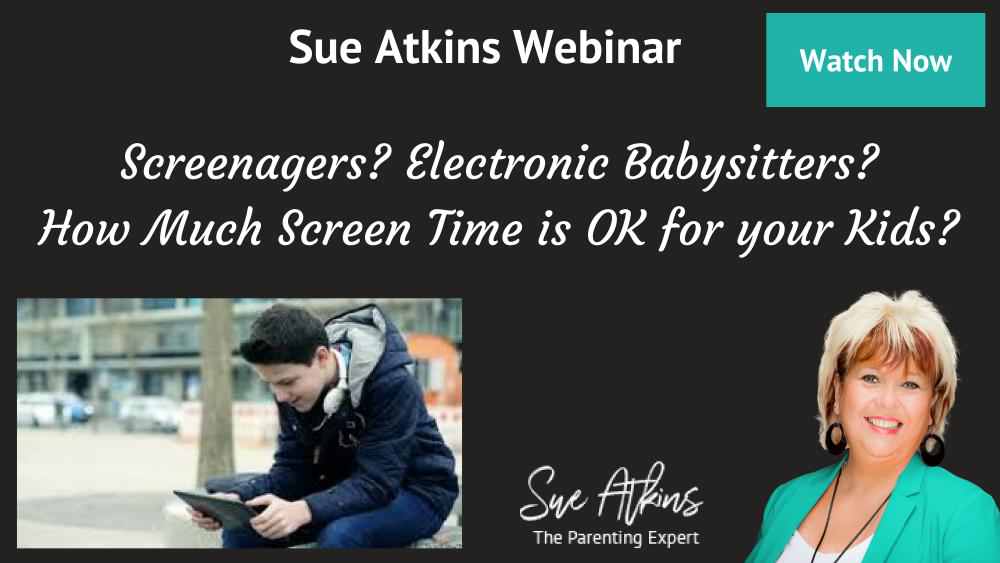


Like it? Share it!
We don’t actually know the damage screen time may do to our kids mental or physical health and wellbeing yet – as the repercussions won’t be known for another 20 or 30 years despite what the Royal College of Paediatrics and Child Health recent new guidance to parents around children’s screen time suggests.
But what is certain is that we need to be a ‘Positive Role Model’ and to find a healthy balance around Technology & Social Media.
Children learn how to use & balance technology by watching us, as their parents, so modelling healthy habits by balancing media time with real time is really important.
One simple way to find that balance ( as it’s not about banning) is to start thinking about my ‘ING’ idea based around my #FamilyFun activities.
Replace screen time with something else that’s fun away from the screens – regardless of your kids ages – think ‘ING’ – bowlING, cyclING, playING, chattING, cookING, readING, dancING, buildING, explorING, gardenING … – you get the idea.
Children spell love T-I-M-E so make coming off the screens interesting and fun. Remember you’re building memories that will last both your lifetimes.
Don’t nag, lose your temper or trash your kids iPad like Kirsty Allsopp!
Think about what your kids are doing on a screen, put boundaries around what they watch, what they play and for how long they play for – then make coming off more compelling than staying on – don’t do what a recent client of mine suggested to their kids that they stop playing Fortnight to do their physics homework!
Head over to my #FamilyFun page on Facebook and post up your ideas, suggestions & pictures of your family having fun OFF screen!
Just ‘Pause to Ponder’ when you use your screen and for how long.
Are you on social media or pinging a quick email reply when your kids are trying to talk to you?
We’ve all been that parent. We answer emails, update Facebook, take a conference call, and try to get in that one last text. The thing is, kids notice and they will get naughty, play up or eventually copy you !
Lots of studies address the impact of screen time on kids but researchers are just beginning to look into the effect that parents’ screen use has on children.
It would be so much easier if the Royal College of Paediatrics and Child Health just gave us a recommended daily time limit so we’d all know when to stop but in the meantime, we’ll need to try to find a balance.
Here are the RCPCH series of questions which aim to help families make decisions about their screen time use for you to consider:
The American Academy of Paediatrics (AAP) suggests more specific guidelines which I also recommend:
I help parents develop a personalised media plan for their children.
A Media Plan should take into account each of your child’s age, health, personality, and developmental stage.
Once we have created your Family Media Plan it gives you clarity, confidence and balance and then it’s a good idea to remember to communicate your plan to other caregivers, such as babysitters or grandparents, so that your media rules are followed consistently.
If you’d like to work with me on your family’s Media Plan, book an an appointment here for an hour and we can connect via Skype, FaceTime, speak on the phone or you can visit me at my Practice.
You can download my ‘The Sue Atkins Appropriate Age and Stage Screen Time Checklist’ from my Resources page

You can also watch my Webinar, Screenagers? Electronic Babysitters? How Much Screen Time is OK for your Kids? bursting with my tried and tested tips, and some ‘pause to ponder’ moments.

Discussing every possible aspect of parenting, giving you advice and support on topics which affect your daily life. Each free, weekly episode is bursting with practical tips, techniques and ideas.
I will teach you my no-nonsense, simple techniques & give you hundreds of my expert parenting articles, videos & podcasts so you can get back to the business of having fun with your family!



